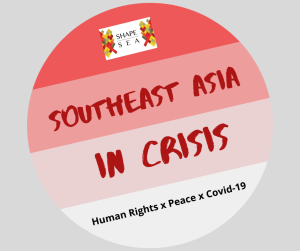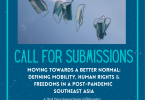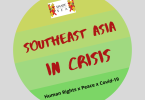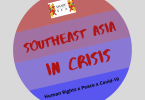Wisnu AdihartonoPh.D in sociology (gender, migration, family, everyday life, Southeast Asian Studies) from École des Hautes Études en Sciences Sociales (EHESS), France. He lives in Jakarta and works as a sociologist and independent researcher. He will be a visiting researcher at Centre for Southeast Asian Studies, National Chi Nan University (NCNU), Taiwan in July 2020
 Covid-19 has indeed changed behaviors and ways people deal with their lives, and how they interact with each other. Governments throughout the world have imposed different policies to curb Covid-19, such as quarantines, movement restrictions, and physical distancing. While this pandemic may have made us all vulnerable, the impacts are far worse for those who are already at the margins of society.Jakarta is one of the most populous cities in the world. Here, we can see tremendous levels of inequalities, with huge gaps betwen the rich and the poor. Individualism is prevailing and the spirit of mutual cooperation is missing. As the Covid-19 situation persists in the country, the government has projected that millions of people will fall into poverty and unemployment due to the pandemic. People from all walks of life increasingly worry about finances. Apart from adjusting to present conditions, they also planning ahead to manage their expenses.Even the nature of interactions between people has drastically changed. It made us examine the usual norms of how we construct and sustain how we think about and create relationships with other people. We, in more ways than one, have become more mindful of our actions that may directly impact the lives of others. According to Wilkin (1979), Nissel and Bonnerjea (1982), Glendinning (1983), Cecil, Offer and St. Leger (1987), and Qureshi and Simons (1987), human relationships tend to change when an illness lingers long. It is said that if it occurs for too long, there can be a possibility that people might start losing empathy and sympathy for each other. On the other hand, social solidarity can very well be the key to beat these negative effects brought about by a wide-scale health crisis like Covid-19.Social solidarity, driven by empathy and sympathy, is needed for us to be in touch with the diverse experiences of people going through such health crisis. It allows us to reach out to others even in trying times. Such solidarity inspires us to take care not only of our ourselves or our families, but also the wider community. We will need collective and concerted actions not only to break the spread of disease, but also to ensure that the poorest and most marginalized are able to cope with the impacts of business closures, mobility restrictions, and other health or security protocols.Social solidarity is a concept already internalized by Indonesians far before Covid-19 hit the country. The spirit of gotong royong, or mutual cooperation, is valued in Indonesian society. It is also the animating force behind the rising social movements initiated by individuals, the private sector, individuals, communities, and civil society, which aims to plug in the gaps on the side of the government to address the impacts of the pandemic that is felt by the society.As Covid-19 continues to worsen social inequalities, it is crucial now, more than ever, to be more aware, and be able to recognize, and appropriately respond to the differentiated impacts of the Covid-19 on various populations and sectors. Failing to look at the multiple dimensions of not just the virus, but government action (or inaction) relevant thereto, may lead us to lose our ability to connect with each other. This, in turn, may aggravate social, economic and political challenges we are facing. In short, I truly hope that as a community, we continue to have faith towards each other and appreciate the feelings of empathy and sympathy, so that when the dust settles, we can improve not just our quality of life, but also the lives of those made more vulnerable and marginalised by Covid-19.References:Ahmed, Faheem, Ahmed, Na’eem, Pissarides, Christopher, and Stiglitz, Joseph. (2020). ‘Why Inequality Could Spread Covid-19?’, in Lancet Public Health 2020, published onlineAllan, Graham. (1989). Friendship, Developing a Sociological Perspective, Harvester Wheat sheaf, HertfordshireCecil, R., Offer, J. and St. Leger, F. (1987). Informal Welfare: A Sociological Study of Care in Northern Ireland, Gower, AldershotFraser, Michael. (2013). ‘Friendship and Politics’, in https://www.humanrights.gov.au/about/news/speeches/friendship-and-politicsGlendinning, C. (1983). Unshared Care: Parents and Their Disabled Children, Routledge&Kegan Paul, LondonJames Madison University. (2020). ‘Empathy and Sympathy’, in https://www.jmu.edu/news/counselingctr/2020/08-ibghaLewis, C. S. (1960). The Four Love, Geoffrey Bles, LondonM D., Neel Burton. (2015). ‘Empathy vs. Sympathy’, in https://www.psychologytoday.com/us/blog/hide-and-seek/201505/empathy-vs-sympathyNissel, M. and Bonnerjea, L. (1982). Family Care of the Handicapped Elderly: Who Pays?, Policy Studies Institute, LondonParker, R. (1981). ‘Tending and social policy’, in E. M. Goldberg and S. Hatch (eds), A New Look at the Personal Social Services, Policy Studies Institute, LondonQureshi, H. and Simons, K. (1987). ‘Resources within families: caring for elderly people’, in J. Branned and G. Wilson (eds), Give and Take in Families: Studies in Resource Distribution, Allen&Unwin, LondonSamboh, Esther. (2020). ‘Three stages of emotion on COVID-19 journey: Where are you now?’, in https://www.thejakartapost.com/news/2020/04/21/three-stages-of-emotion-on-covid-19-journey-where-are-you-now.html?utm_source=newsletter&utm_medium=mailchimp&utm_campaign=mailchimp-april&utm_term=emotional-stageWilkin, D. (1979). Caring for the Mentally Handicapped Child, Croom Helm, London
Covid-19 has indeed changed behaviors and ways people deal with their lives, and how they interact with each other. Governments throughout the world have imposed different policies to curb Covid-19, such as quarantines, movement restrictions, and physical distancing. While this pandemic may have made us all vulnerable, the impacts are far worse for those who are already at the margins of society.Jakarta is one of the most populous cities in the world. Here, we can see tremendous levels of inequalities, with huge gaps betwen the rich and the poor. Individualism is prevailing and the spirit of mutual cooperation is missing. As the Covid-19 situation persists in the country, the government has projected that millions of people will fall into poverty and unemployment due to the pandemic. People from all walks of life increasingly worry about finances. Apart from adjusting to present conditions, they also planning ahead to manage their expenses.Even the nature of interactions between people has drastically changed. It made us examine the usual norms of how we construct and sustain how we think about and create relationships with other people. We, in more ways than one, have become more mindful of our actions that may directly impact the lives of others. According to Wilkin (1979), Nissel and Bonnerjea (1982), Glendinning (1983), Cecil, Offer and St. Leger (1987), and Qureshi and Simons (1987), human relationships tend to change when an illness lingers long. It is said that if it occurs for too long, there can be a possibility that people might start losing empathy and sympathy for each other. On the other hand, social solidarity can very well be the key to beat these negative effects brought about by a wide-scale health crisis like Covid-19.Social solidarity, driven by empathy and sympathy, is needed for us to be in touch with the diverse experiences of people going through such health crisis. It allows us to reach out to others even in trying times. Such solidarity inspires us to take care not only of our ourselves or our families, but also the wider community. We will need collective and concerted actions not only to break the spread of disease, but also to ensure that the poorest and most marginalized are able to cope with the impacts of business closures, mobility restrictions, and other health or security protocols.Social solidarity is a concept already internalized by Indonesians far before Covid-19 hit the country. The spirit of gotong royong, or mutual cooperation, is valued in Indonesian society. It is also the animating force behind the rising social movements initiated by individuals, the private sector, individuals, communities, and civil society, which aims to plug in the gaps on the side of the government to address the impacts of the pandemic that is felt by the society.As Covid-19 continues to worsen social inequalities, it is crucial now, more than ever, to be more aware, and be able to recognize, and appropriately respond to the differentiated impacts of the Covid-19 on various populations and sectors. Failing to look at the multiple dimensions of not just the virus, but government action (or inaction) relevant thereto, may lead us to lose our ability to connect with each other. This, in turn, may aggravate social, economic and political challenges we are facing. In short, I truly hope that as a community, we continue to have faith towards each other and appreciate the feelings of empathy and sympathy, so that when the dust settles, we can improve not just our quality of life, but also the lives of those made more vulnerable and marginalised by Covid-19.References:Ahmed, Faheem, Ahmed, Na’eem, Pissarides, Christopher, and Stiglitz, Joseph. (2020). ‘Why Inequality Could Spread Covid-19?’, in Lancet Public Health 2020, published onlineAllan, Graham. (1989). Friendship, Developing a Sociological Perspective, Harvester Wheat sheaf, HertfordshireCecil, R., Offer, J. and St. Leger, F. (1987). Informal Welfare: A Sociological Study of Care in Northern Ireland, Gower, AldershotFraser, Michael. (2013). ‘Friendship and Politics’, in https://www.humanrights.gov.au/about/news/speeches/friendship-and-politicsGlendinning, C. (1983). Unshared Care: Parents and Their Disabled Children, Routledge&Kegan Paul, LondonJames Madison University. (2020). ‘Empathy and Sympathy’, in https://www.jmu.edu/news/counselingctr/2020/08-ibghaLewis, C. S. (1960). The Four Love, Geoffrey Bles, LondonM D., Neel Burton. (2015). ‘Empathy vs. Sympathy’, in https://www.psychologytoday.com/us/blog/hide-and-seek/201505/empathy-vs-sympathyNissel, M. and Bonnerjea, L. (1982). Family Care of the Handicapped Elderly: Who Pays?, Policy Studies Institute, LondonParker, R. (1981). ‘Tending and social policy’, in E. M. Goldberg and S. Hatch (eds), A New Look at the Personal Social Services, Policy Studies Institute, LondonQureshi, H. and Simons, K. (1987). ‘Resources within families: caring for elderly people’, in J. Branned and G. Wilson (eds), Give and Take in Families: Studies in Resource Distribution, Allen&Unwin, LondonSamboh, Esther. (2020). ‘Three stages of emotion on COVID-19 journey: Where are you now?’, in https://www.thejakartapost.com/news/2020/04/21/three-stages-of-emotion-on-covid-19-journey-where-are-you-now.html?utm_source=newsletter&utm_medium=mailchimp&utm_campaign=mailchimp-april&utm_term=emotional-stageWilkin, D. (1979). Caring for the Mentally Handicapped Child, Croom Helm, London





